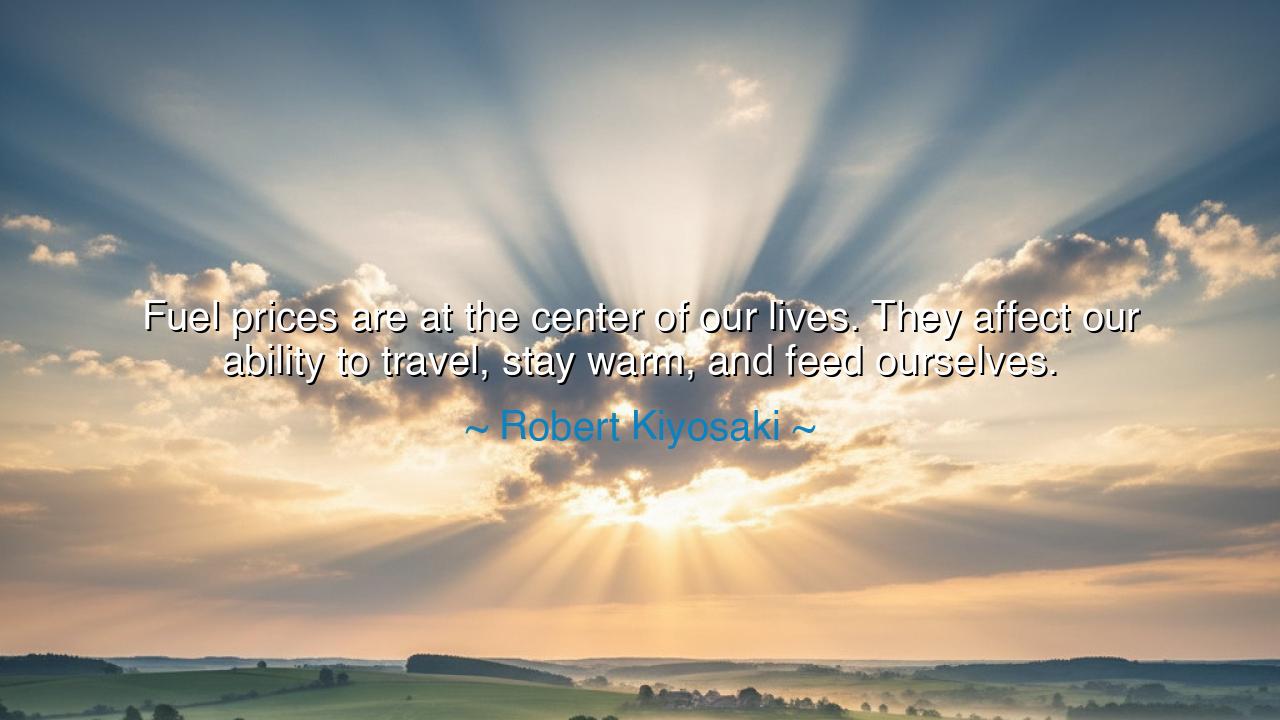
Fuel prices are at the center of our lives. They affect our
Fuel prices are at the center of our lives. They affect our ability to travel, stay warm, and feed ourselves.






So spoke Robert Kiyosaki, teacher of money and voice of practical wisdom: “Fuel prices are at the center of our lives. They affect our ability to travel, stay warm, and feed ourselves.” These words, though clothed in the language of economics, carry the deeper weight of survival itself. They remind us that beyond abstractions of wealth and finance, the rhythms of human life are bound to the forces that power our world. Without fuel, the wheels of civilization grind to a halt, the homes of men grow cold, and the fields that give us bread stand barren.
At the heart of his words lies the truth that fuel is more than oil or gas—it is the fire that sustains the body of society. In the ancient days, it was wood and coal, carried by hand and burned to give warmth. In modern times, it is oil, gas, and electricity, drawn from the deep earth and harnessed to move vehicles, to light cities, to transport goods. Without it, there is no travel, no commerce, no exchange of ideas across great distances. The caravan without camels, the ship without wind, the engine without fuel—all are alike, powerless.
History bears witness to this dependence. In the winter of 1941, as Hitler’s armies advanced into the Soviet Union, it was not only men and bullets that decided the fate of war, but fuel. The German tanks, mighty and terrifying, grew useless when their supply lines broke. Engines froze, machines stalled, and the great invasion faltered not because of lack of courage, but because the fire that powered steel had been extinguished. Thus, even empires rise and fall on the strength of their fuel.
And what of warmth? In the bitter winter of Valley Forge, George Washington’s army shivered in tattered clothes, their bodies weak, their spirits low. They had food, but little wood for fire. It was not the musket alone that threatened them, but the cold that crept into their bones. Fuel is not only commerce—it is life itself. To stay warm is to live, and to lose warmth is to perish. In this, Kiyosaki speaks with the voice of all generations: fuel is not luxury, but necessity.
And finally, the matter of food. The bread on our tables does not appear by magic. It is carried by truck, ship, or plane, all of which demand fuel. The farmer tills with machines that drink deeply of it, the market shelves are filled by systems built upon it. Without fuel, the harvest rots in the field, and the city starves. So deeply woven into the act of feeding ourselves is the price and presence of fuel that we scarcely notice it—until it falters, and then we remember with terror how fragile our lives are.
The lesson is clear: we must never take the fire of civilization for granted. To depend wholly on what is scarce and costly is to build a house upon sand. We must be wise, as our ancestors were, seeking new ways to power our world, diversifying our strength, and never allowing ourselves to be enslaved by the rise and fall of fuel prices. For wisdom does not merely endure hardship—it prepares for it before it comes.
Practically, this means seeking balance in our own lives. Be mindful of consumption. Support new energies where possible. Live not in waste, but in stewardship, knowing that every flame, every engine, every journey depends upon resources drawn from the earth. And when prices rise, do not despair, but adapt—simplify where you can, conserve what you must, and remain grateful for the fire that sustains your life.
Thus, Kiyosaki’s words shine with the light of both warning and guidance: “Fuel prices are at the center of our lives.” Remember this, and walk wisely. For though money may come and go, the forces that power our world shape the destiny of nations and the survival of every soul. Let us then live not in ignorance, but in awareness, treating energy as sacred, and preparing ourselves to endure when storms shake the foundations of supply. In this, we walk the ancient path of wisdom—mindful, resilient, and strong.






AAdministratorAdministrator
Welcome, honored guests. Please leave a comment, we will respond soon